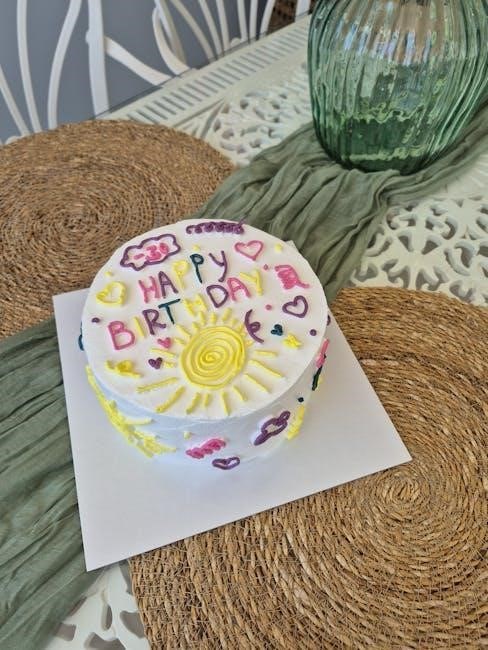Tawaf is a central Islamic ritual in Umrah and Hajj, involving seven circuits around the Kaaba. It embodies unity, devotion, and spiritual connection to Allah, reflecting deep faith. Mandatory for pilgrims, Tawaf strengthens the bond with Allah and fosters unity among all believers.
1.1 Brief Overview of Tawaf in Islamic Rituals
Tawaf is a fundamental Islamic ritual performed during Umrah and Hajj, involving circumambulation of the Kaaba seven times. It symbolizes unity, devotion, and a deep spiritual connection to Allah. Pilgrims circle the Kaaba counterclockwise, reflecting on their faith and humility. Tawaf is a mandatory act that strengthens the bond between the believer and Allah, embodying submission and gratitude. It is a cornerstone of Islamic pilgrimage, fostering a sense of community and shared purpose among all participants. The ritual is rich in historical and religious significance, tracing back to the Prophet Ibrahim (AS) and the sacred traditions of Islam.
1.2 Importance of Performing Tawaf During Umrah or Hajj
Tawaf holds profound spiritual significance in Islamic pilgrimage, serving as a symbol of unity, devotion, and submission to Allah. It is a mandatory ritual in both Umrah and Hajj, reflecting the believer’s humility and connection to the Divine. By circumambulating the Kaaba, pilgrims embody the unity of the Muslim community and honor the sacred traditions of Prophet Ibrahim (AS). Tawaf is not only an act of worship but also a means to seek forgiveness, guidance, and spiritual renewal. Its performance strengthens faith, fosters gratitude, and deepens the pilgrim’s relationship with Allah, making it a cornerstone of the Islamic pilgrimage experience.
Preparation for Tawaf
Preparation for Tawaf involves ensuring physical purity through Wudu, wearing clean attire, and maintaining a focused mindset. Pilgrims must avoid distractions and approach with sincerity and respect.
2.1 Making the Intention (Niyyah) for Tawaf
Making the intention (Niyyah) for Tawaf is a fundamental step, ensuring the act is performed sincerely for Allah’s pleasure. Stand facing the Kaaba, recite the initial Dua, and silently declare your purpose. The intention must be pure, reflecting a desire to seek closeness to Allah and fulfill a sacred obligation. This mental preparation aligns the heart with the spiritual significance of the ritual. The Prophet (PBUH) emphasized that actions are judged by their intentions, making Niyyah the cornerstone of Tawaf. Pilgrims should focus on humility and devotion, setting aside worldly thoughts to fully engage in this sacred act.
2.2 Physical and Spiritual Preparation Before Starting Tawaf
Physical and spiritual preparation is essential before beginning Tawaf. Pilgrims should ensure physical purity by performing Wudu and wearing clean, modest attire, including Ihram for those in a state of pilgrimage. Facing the Kaaba, one should recite the initial Dua to seek Allah’s blessings. Spiritually, the heart must be cleansed of worldly distractions, focusing on humility and sincerity. Avoiding unnecessary conversation, pilgrims should approach Tawaf with reverence, seeking forgiveness and divine mercy. This dual preparation—body and soul—ensures the ritual is performed with the utmost devotion, aligning with its sacred purpose and deepening the spiritual connection to Allah.
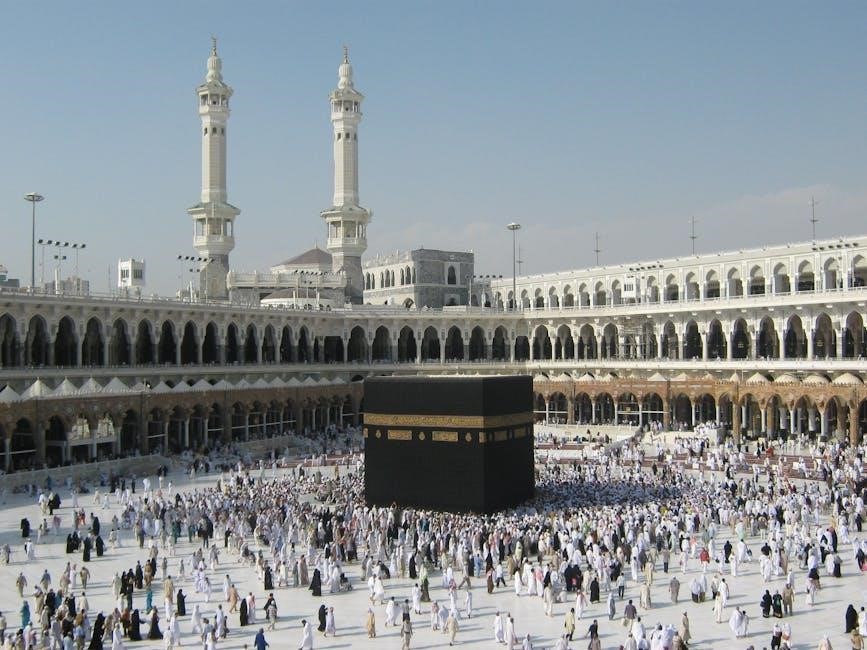
The Ritual of Tawaf
Tawaf involves circumambulating the Kaaba seven times, starting and ending at the Black Stone. Each round holds spiritual significance, fostering a deep connection to Allah;
3.1 Starting Tawaf: Facing the Kaaba and Reciting Initial Duas
Starting Tawaf requires facing the Kaaba and standing near the Black Stone. Pilgrims raise their hands in supplication, reciting the opening dua: “Bismillahi Allahu Akbar” (In the name of Allah, Allah is the Greatest). This act signifies the beginning of the ritual, seeking divine acceptance. The initial dua is crucial, as it sets the spiritual tone for the circumambulation. Many also recite the Quranic verse: “Innallahu yusallii alaa nabiyyil hasanah” (Allah sends blessings upon the Prophet). This moment is a profound opportunity to connect with Allah, expressing gratitude and humility before commencing the seven rounds.
3.2 Circumambulating the Kaaba: 7 Rounds and Their Significance
Circumambulating the Kaaba involves moving counterclockwise around the holy structure seven times. Each round is a sacred act of worship, symbolizing unity with Allah and the global Muslim community. Pilgrims maintain a state of humility and focus, reciting specific duas for each round to enhance spiritual reflection. The first three rounds are performed at a brisk pace for men, while the remaining four are done at a normal walking pace. This ritual embodies obedience to divine commands and strengthens the pilgrim’s bond with Allah. The seventh round concludes with a final supplication, symbolizing completion of the Tawaf and readiness to move to the next ritual, Sa’i.
Duas for Each Round of Tawaf
This section outlines the specific supplications recited during each of the seven rounds of Tawaf, reflecting devotion, mercy, and spiritual connection to Allah.
4.1 Dua for the First Round
The first round of Tawaf begins with a heartfelt supplication, seeking Allah’s mercy and forgiveness. The recommended dua is:
“Allahumma inni as’aluka ilman nafi’an, wa rizqan waasi’an, wa shifan min kulli da’in, bi rahmatika ya arhamar rahimeen.”
Translation: “O Allah, I ask You for beneficial knowledge, abundant sustenance, and healing from every ailment, with Your mercy, O Most Merciful.”
This dua reflects the pilgrim’s desire for spiritual and physical well-being, emphasizing trust in Allah’s grace and compassion during the sacred ritual of Tawaf.
4.2 Dua for the Second Round
During the second round of Tawaf, pilgrims often recite a supplication seeking Allah’s guidance and forgiveness. The recommended dua is:
“Rabbighfir warham wa anta khairur rahimeen. Wa tub ‘alayya, innaka antat-Tawwabur Rahim.”
Translation: “Lord, forgive and have mercy, for You are the best of the merciful. Turn to me, for You are the Oft-Returning, the Most Merciful.”
This dua emphasizes seeking divine pardon and expressing humility, aligning with the spiritual essence of Tawaf as a means of Drawing closer to Allah.
4.3 Dua for the Third Round
During the third round of Tawaf, a recommended supplication is:
“Rabbana atina fid-dunya hasanatan wa fil-akhirati hasanatan wa qina adhaban-nar. Wa adkhilnal jannata ma’a al-abrar. Wa ighfir lana wa irhamna, wa anta khairur rahimien.”
Translation: “Our Lord, grant us good in this world and good in the Hereafter, and protect us from the punishment of the Fire. Admit us into Paradise among the righteous, and forgive us, have mercy on us, for You are the best of those who show mercy.”
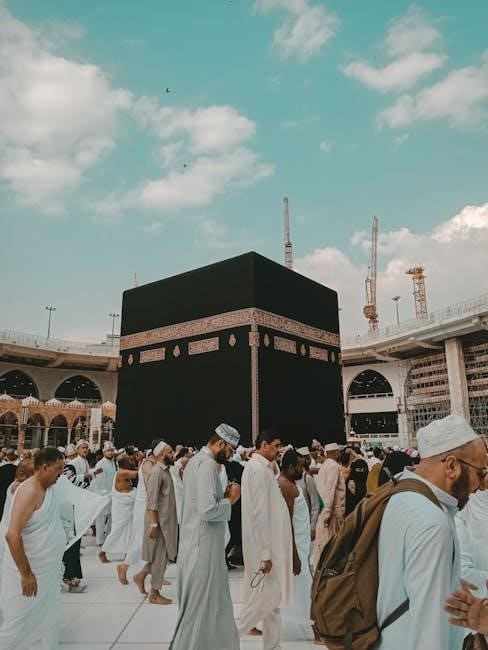
This dua reflects the pilgrim’s desire for blessings in both worlds and protection from hellfire, embodying the spiritual essence of Tawaf.
4.4 Dua for the Fourth Round
During the fourth round of Tawaf, pilgrims often recite the following supplication:
“Allahumma ighfir li dhambiya, wa ahyini bijanabi lil-magfirati, wa aslih qalbi, wa ajirni minash-sharri.”
Translation: “O Allah, forgive my sins, grant me life with repentance, purify my heart, and protect me from evil.”
This dua emphasizes seeking divine forgiveness, purification of the heart, and protection from harmful influences, aligning with the spiritual cleansing Tawaf symbolizes. It reflects the believer’s quest for moral and spiritual renewal.
4.5 Dua for the Fifth Round
During the fifth round of Tawaf, pilgrims often recite the following supplication:
“Allahumma arinil haqaqa, wahdini lil-hudaa, wa inaabni ilaika fi yusri wa izzatika.”
Translation: “O Allah, show me the truth, guide me to the right path, and grant me ease and honor in Your obedience.”
This dua highlights the seeker’s desire for divine guidance, truth, and steadfastness in faith. It reflects the believer’s trust in Allah’s wisdom and the pursuit of spiritual and moral uprightness.
4.6 Dua for the Sixth Round
During the sixth round of Tawaf, pilgrims often recite the following supplication:
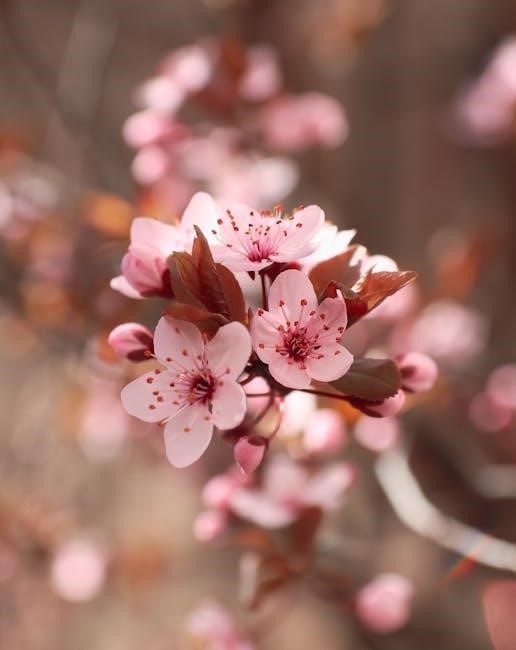
“Allahumma ighfir li dhambiya, wa irhamni bi-rahmatika, wa anta arhamur rahimeen.”
Translation: “O Allah, forgive my sins, have mercy on me with Your mercy, and You are the Most Merciful of those who show mercy.”
This dua emphasizes the seeker’s humility and plea for divine forgiveness and compassion. It underscores the belief in Allah’s boundless mercy and the importance of seeking His pardon during this sacred ritual.
4.7 Dua for the Seventh Round
During the seventh round of Tawaf, pilgrims often recite the following supplication:
“Allahumma antas-salam, wa minkas-salam. Fa ajirna minash-sharr, wa antajir.”
Translation: “O Allah, You are the source of peace, and from You comes peace. Protect us from evil, and You are the Protector.”
This dua concludes the seventh round, emphasizing the seeker’s reliance on Allah for safety, peace, and protection from harm; It reflects the pilgrim’s gratitude for completing Tawaf and their trust in Allah’s divine care.
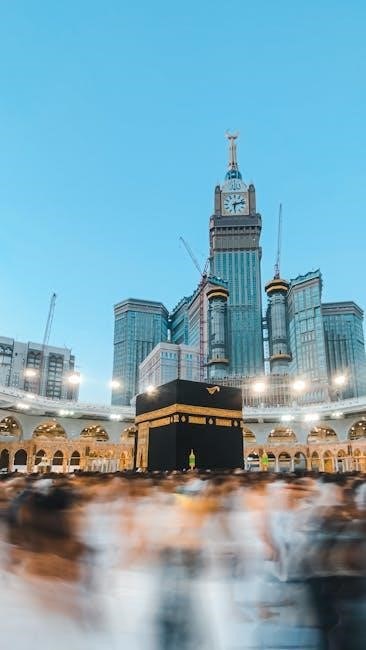
Completing Tawaf
Upon completing seven rounds, pilgrims face the Kaaba, reflecting on their spiritual journey. The Tawaf concludes here, marking fulfillment of this sacred ritual.
5.1 Facing the Kaaba After Completing 7 Rounds
Upon completing the seventh round, pilgrims face the Kaaba, symbolizing the culmination of Tawaf. This moment is sacred, often filled with personal reflection and gratitude. Pilgrims may recite specific duas, seeking Allah’s blessings and forgiveness. Facing the Kaaba after Tawaf is a deeply spiritual act, emphasizing the connection to the holy site and the completion of the ritual. It is a time for silent supplication, expressing thanks for the opportunity to perform this sacred duty. Many also take a moment to seek divine guidance and strength before proceeding to the next rituals, such as the optional two rakats of Nafl prayer.
5.2 Offering Two Rakats of Nafl Prayer (Optional)
After completing Tawaf, pilgrims may optionally offer two rakats of Nafl prayer near the Kaaba or elsewhere in the Haram. This prayer is a voluntary act of worship, reflecting gratitude and humility. It is recommended to face the Kaaba while praying, maintaining focus and sincerity. The Nafl prayer serves as a spiritual complement to Tawaf, allowing pilgrims to deepen their connection with Allah. Many choose to recite specific Qur’anic verses or duas during this prayer, seeking blessings and guidance. This optional act enriches the pilgrimage experience, fostering a sense of peace and spiritual fulfillment after the Tawaf ritual.
Tawaf is a deeply spiritual ritual, offering immense rewards and fostering a strong connection with Allah. Pilgrims should approach it with sincerity, reflecting on its profound significance and blessings.
6.1 The Spiritual Rewards of Performing Tawaf
Performing Tawaf is a deeply rewarding spiritual act, offering forgiveness of sins, divine mercy, and abundant blessings. It strengthens one’s connection to Allah, fostering humility and gratitude. The ritual cleanses the heart, grants inner peace, and brings believers closer to their Creator. Tawaf symbolizes unity and submission, reflecting the harmony of the Islamic community. Each round is a step toward spiritual elevation, and sincere performance ensures divine acceptance. Pilgrims often feel a profound sense of fulfillment, knowing their efforts are met with Allah’s grace and eternal rewards.
6.2 Final Tips for Pilgrims Performing Tawaf
Pilgrims should approach Tawaf with sincerity and focus, ensuring their heart and mind are fully engaged. Maintain calm and patience, especially in crowded conditions, to preserve the ritual’s sanctity. Memorize the recommended duas for each round to enhance the spiritual experience. Carry a dua guide or use reliable resources to stay informed. Prioritize hygiene and respect the sacred space by avoiding unnecessary conversations. Women should ensure proper hijab and modesty throughout. After completing Tawaf, take a moment to reflect on the blessings and seek Allah’s forgiveness. Remember, the essence lies in devotion, humility, and gratitude, making the experience truly transformative.

